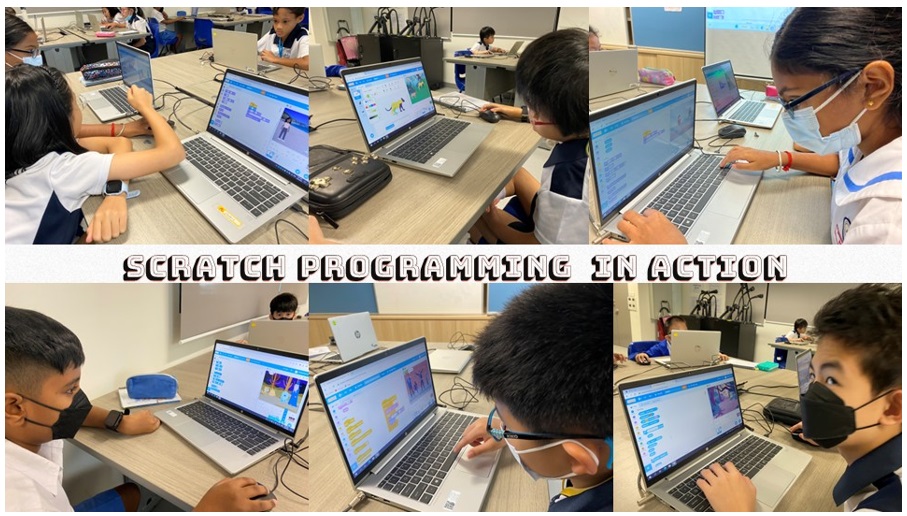Infocomm Club
Infocomm Club
The Infocomm Club strives to ignite students’ enthusiasm for technology in an engaging and purposeful manner, emphasizing skills such as photography, videography, animation, and programming. Our mission is to foster leadership and entrepreneurship from a young age, equipping students with essential digital-age competencies. Furthermore, we endeavor to offer students avenues to unleash their creativity and foster a sense of community spirit within our club.
Our Framework
Here's a structured framework to equip Infocomm Club members with the
knowledge and skills to harness the power of ICT for positive purposes,
maintain a positive presence in cyberspace, and be safe and responsible
users of ICT.
1. ICT Fundamentals:
Begin by providing a comprehensive understanding of Information and Communication
Technology (ICT), including its basic concepts, components, and functionalities.
2. Digital Literacy:
Educate members on essential digital literacy skills, such as effective
internet searching, evaluating online sources for credibility, and discerning
between reliable and unreliable information.
3. Cybersecurity Awareness:
Offer training sessions on cybersecurity best practices, covering topics
such as creating strong passwords, identifying phishing attempts, securing
personal data, and recognizing online threats.
4. Positive Online Presence:
Teach strategies for cultivating a positive online presence, including
maintaining professional profiles on social media platforms, engaging in
respectful online communication, and showcasing digital portfolios or projects
effectively.
5. Ethical ICT Use:
Discuss the ethical considerations of ICT usage, emphasizing principles
such as respect for intellectual property rights, proper citation of sources,
and responsible sharing of digital content.
6. Digital Citizenship:
Encourage the development of responsible digital citizenship by promoting
values like empathy, integrity, and accountability in online interactions.
Discuss the impact of digital actions on individuals, communities, and
society at large.
7. Critical Thinking and Media Literacy:
Foster critical thinking skills to help members evaluate digital content
critically, identify misinformation or propaganda, and make informed judgments
about online information.
8. Safe Online Behaviour:
Provide guidance on safe online behavior, including setting privacy settings
on social media accounts, managing online interactions with strangers,
and recognizing and reporting cyberbullying or harassment.
9. ICT for Positive Change:
Inspire members to leverage ICT for positive social change and community
engagement. Encourage them to explore opportunities for using technology
to address societal challenges, promote inclusivity, or advocate for meaningful
causes.
10. Continuous Learning and Adaptation:
Provide resources for further skill development and opportunities for
members to explore new ICT tools and applications.
By implementing this framework, Infocomm Club members can develop the knowledge, skills, and attitudes needed to harness the potential of ICT for positive purposes while navigating cyberspace safely and responsibly.
Our Focus
Infocomm Club members are expected to embody the following qualities:
1. Confident Communication:
Members should demonstrate confidence in expressing ideas both verbally
and in written form across digital and non-digital platforms. They should
excel in public speaking, presenting concepts effectively, and articulating
thoughts clearly in various mediums.
2. Creative Thinking:
Club members should possess a creative mindset, capable of leveraging
a variety of tools and media channels to communicate messages innovatively.
They should strive to make meaningful contributions to their school and
society through imaginative approaches to communication.
3. Respectful and Responsible Engagement:
Infocomm Club members are required to engage in all communication activities
with respect and responsibility, especially when opinions or viewpoints
differ. They should foster an environment of mutual respect, open-mindedness,
and constructive dialogue in all their interactions, both online and offline.
By embodying these attributes, Infocomm Club members can effectively communicate,
innovate, and contribute positively to their school and wider community.
Our Projects
Infocomm Club members will have the opportunity to explore a diverse range
of skills and projects, including:
1. Photography:
Members will learn the fundamentals of photography, including composition,
lighting, and subject framing. They will also delve into photo editing
techniques to enhance and refine their images. As part of a photography
project, they may collaborate on creating a photobook or organizing a photo
exhibition to showcase their work.
2. Videography:
Through hands-on experience, members will develop skills in video production,
including shooting footage, sound recording, and video editing. They will
have the chance to participate in a junior reporter project, where they
can create informative and engaging video content on various topics of
interest.
3. Scratch Programming:
Club members will explore Scratch programming, a beginner-friendly platform
for creating animations and games. They will learn the basics of coding
logic and apply their skills to design interactive animations and simple
games.
4. Coding Programming:
Members will delve deeper into coding through various programming languages,
such as Python, JavaScript, or Java. They will learn programming concepts
and techniques to develop software applications, websites, or other digital
solutions.
5. Microbit:
Through hands-on projects, members will learn to program Microbit, a microcontroller
used for creating interactive projects. They will explore coding concepts
while designing and building various gadgets, games, or interactive displays
using Microbit technology.
6. 3D Modelling:
Club members will be introduced to the world of 3D modelling, where they
will learn to create three-dimensional digital models. They will explore
techniques for modeling, texturing, and rendering objects or scenes in
3D space.
7. Animation:
Members will learn the principles of animation and explore different animation
techniques, including traditional hand-drawn animation, digital animation,
and stop-motion animation. They will have the opportunity to create their
own animated shorts or projects using animation software.
Through these learning opportunities and hands-on projects, Infocomm Club
members will develop valuable technical skills, foster creativity, and
gain practical experience in various aspects of technology and digital
media production.
Club Members at Work


